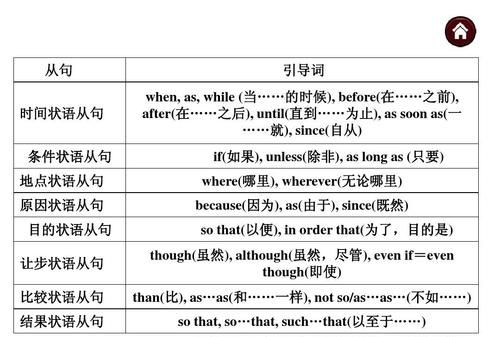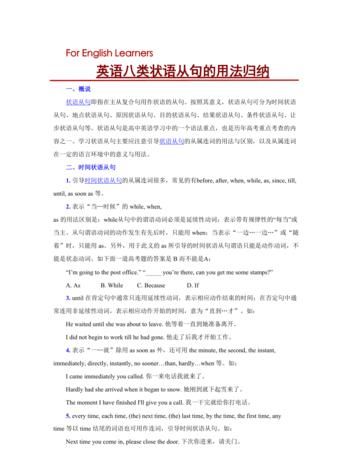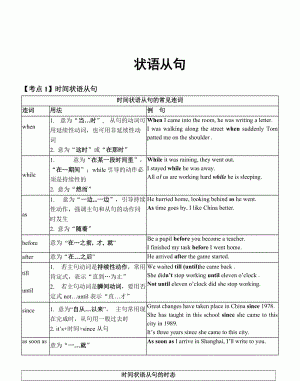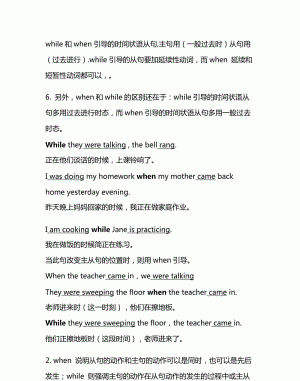本文目录
英语语法状语从句
一. 状语从句的概念
状语:状语修饰动词、形容词、副词或全句,说明方式、因果、条件、时间、地点、让步、方向、程度、目的等。
状语在句子中的位置很灵活,常见情况为:通常在句子基本结构之后,强调时放在句首;修饰形容词或副词时,通常位于被修饰的词之前;表示时间、地点、目的的状语一般位于句子两头,强调时放在句首,地点状语一般须在时间状语之前;一些表示不确定时间(如:often)或程度(如:almost)的副词状语通常位于be动词、助动词、情态动词之后,动词之前。
二. 状语从句的类型
1. 地点状语从句
地点状语从句通常由where, wherever引导。
例如:
Where I live there are plenty of trees.
在我住的地方有很多树。
Wherever I am I will be thinking of you.
不管我在哪里,我都会想到你。
2. 方式状语从句
方式状语从句通常由as, as if, as though引导。
(1)as的用法
Will you please do the experiment as I am doing?
请按我的方法做这个实验好吗?
(2)as if, as though的用法
①引导的方式状语从句所表示的情况是事实或具有很大的可能性时,通常用陈述语气,常与look/seem/taste/smell/sound等词连用。
It looks as if it is going to rain.
看来要下雨。
②从句所表示的情况不是事实,而是主观的想象或夸大性的比喻,通常用虚拟语气。
The injured man acted as if nothing had happened to him.
这个受伤的男子行动起来似乎什么也没有发生似的。
说明:
as if/as though也可以引导一个分词短语、不定式短语。
例如:
He stared at me as if seeing me for first time.
他目不转睛地看着我,就像第一次看见我似的。
He cleared his throat as if to say something.
他清了清嗓子,像要说什么似的。
3 原因状语从句
because,as,since与for的不同用法:
相同之处:
中文都表示“因为”,均为连词。
区别:
(1) 如果表示原因的状语从句语气较强,在整个句子中占重要位置,是句子的主要部分,一般用“because”。即回答why问句的提问,应用because。
— Why did they come to China? 他们为什么要去中国?
— Because their father wanted to work in China. 因为他们的父母想到中国工作。
(2) 如果原因不重要,或为人所知,一般用as或since。它所引导的从句常常放在句首。
As you ask, I will tell you.
你既然问我,我就告诉你。
(3) for引导的句子表示原因,语气较because弱,类似一种补充说明,一般不用它来回答why提出的问题。它引导的从句不能放在句首,而且前面一般用逗号与主句分开。
We can’t go, for it’s raining.
由于天下雨,我们不能走了。
说明:
for是并列连词。
4 目的状语从句
表示目的状语从句可以由that, so that, in order that, lest, for fear that, in case等词引导。
例如:
You must speak louder so that/in order that you can be heard by all.
你必须大点声,别人就能听见了。
Better take more clothes in case the weather is cold.
最好多穿点衣服,以防天冷。
5 结果状语从句
结果状语从句常由so…that或such…that引导。so...that与such…that之间可以转换。
例如:
The boy is so young that he can’t go to school.
(= He is such a young boy that he can’t go to school.)
这男孩年龄太小,不能上学。
6 条件状语从句
连接词主要有if, unless, as/so long as, on condition that等。if引导的条件句有真实条件句和非真实条件句两种。非真实条件句已在虚拟语气中阐述。
unless = if not.
例如:
Let’s go out for a walk unless you are too tired.
(= If you are not too tied, let’s go out for a walk.)
如果不太累,我们去散散步。
典型例题
You will be late ______ you leave immediately.
A. unlessB. untilC. ifD. or
答案A。句意:除非你立即走,否则你就会迟到的。可转化为 If you don’t leave immediately, you will be late。B、D句意不对,or表转折。
7 让步状语从句
(1)though, although引导的让步状语从句,后面的从句不能有but,但是though和yet可连用。
例如:
Although it’s raining, they are still working in the field.
虽然在下雨,但他们仍在地里干活。
(2)as, though引导的让步从句必须表语或状语提前(形容词、副词、分词、实义动词提前)。
例如:
Child as though he was, he knew what was the right thing to do.
虽然他是个孩子,但是他知道该做什么,不该做什么。
(3)ever if, even though即使。
例如:
We’ll make a trip even though the weather is bad.
即使天气不好,我们也要去远足。
(4)whether…or… 不管……都。
例如:
Whether you believe it or not, it is true.
信不信由你,这确实是真的。
(5)“no matter +疑问词”或“疑问词+后缀ever”。
例如:
No matter what happened, he would not mind. (= Whatever happened, he would not mind.)
不管发生什么,他不在意。
替换:
no matter what = whatever
no matter who = whoever
no matter when = whenever
no matter where = wherever
no matter which = whichever
no matter how = however
注意 :no matter 不能引导主语从句和宾语从句。
(错)No matter what you say is of no use now.
(对)Whatever you say is of no use now.
你现在说什么也没用了。
(错)Prisoners have to eat no matter what they’re given,
(对)Prisoners have to eat whatever they’re given.
囚犯们只能给什么吃什么。
英语语法 | 状语从句【 春喜外语 】供稿!春喜外语,学英语告别复读模式,与 真人外教一对一 面对面交谈,不管帅哥还是美女都任你选择。 在线英语培训 ,只要有网络就可以轻松进入学习状态,老师、上课时间、地点你说了算。5年时间12000名学员的共同选择,欲了解更多详情,欢迎咨询在线客服!

翻译下面方式状语从句英翻中 I really dont care for the way
我真的不喜欢你和我说话的方式。就好像你是我的父亲。
你应该把每一天都当作是最后一次和利用你的优势。这意味着设定目标,融入校园和社区生活,努力工作,而且最重要的是,永远不要放弃。

方式状语从句just as怎么翻译
just as
英[dʒʌst æz] 美[dʒʌst æz]
翻译:正如; 正像; 犹如;
例句:
I hate Lewis and his kind just as much as you do.
我和你一样痛恨刘易斯之流。
Do it just as I have told you.
就像我告诉你的那样去做。

时间状语从句题目及解析
Adverbial Clauses
状语从句 1.分类
英语状语从句可表示时间、地点、条件、方式、让步、原因、比较、目的、结果等意义。不同的状语从句要求不同的连词或相当于连词的词组引出。以下是常用的引导状语从句的连词:
时间状语:when, while, as, before, after, since, until, the moment, as soon as
地点状语:where, wherever
条件状语:if, unless, as/so long as, suppose
方式状语:as, as if, as though
让步状语:though, although, even if, even though
原因状语:as, because, since, now that
比较状语:as...as, than, the...the, not so...as
目的状语:so that, in order that, for fear that, in case
结果状语:so that, so...that, such...that, that 2.时间状语从句
The street were less crowded when Mr.Budd let him out.
巴德先生让他出来的时候,街上行人已少了一些。
I'll come back as soon as is over.
一下课我就回来。
Please don't go anywhere before I come back.
我回来之前,哪儿也别去。
The telephone rang while I was having a bath.
我洗澡时,电话铃响了。 1)表示将来时间时,时间状语从句须用一般时态代替将来时态。
We will go fishing if it is fine tomorrow.
如果明天晴,我们就去钓鱼。
Soon after you jump, the parachute will open.
你一跳,降落伞就会打开。 2)when, while, as在引导时间状语从句时的区别:when表示从句的动作与主句的动作一个紧接着一个发生,也可表示从句动作在主句动作之前或之后发生。从时间上来说,它既可指一段时间,也可指某一具体时刻。
She opened the door when she heard the door bell.
她听到门铃响就把门打开了。
When he called, I was making lunch in the kitchen.
他来电话时,我正在厨房做午餐。
I used to eat in small restaurants when I was in London.
我在伦敦时,常在小饭馆吃饭。
I'll tell him about in when I see him.
我看到他时我会告诉他的。 while表示从句的动作与主句的动作同时发生,从句动作往往是有延续性的,因此从句所用的谓语动词往往是延续性的动词。从时间上来说,while指一段时间。
The light went out while I was reading the newspaper.
我正在读报时,灯灭了。
He repaired the leaking tab while the rest of the family were watching TV.
家里其他人在看电视的时候,他把漏水的龙头给修好了。
as表示某事发生的过程中另一件事发生了,亦可用来表示两个同时发生的动作。
As I drove past the crossroads, a red car suddenly shot right past me.
我开车过十字路口时,一辆红色的轿车突然从我旁边飞驰而过。
A look of surprise came into his eyes as he read the message.
他读着条子,眼里流露出吃惊的神情。
As he did so he nearly ran into a large man who suddenly came in through the doorway.
就在他这么做的时候,他几乎与一个突然进来大个子撞了个满怀。 3.地点状语从句
where, wherever引导地点状语,意思与in/at/to/the place where接近。
I'll drive you wherever you are going.
你去任何地方我都开车送你去。
You have the right to live where you want.
你有权住在你想住的地方。
It's your fault that she is where she is.
她落到今天这个地步是你的错。
Where there is a will, there is a way.
有志者事竟成。 4.原因状语从句
引导原因状语从句的连词主要有because, as, since。because表示的语气最强,通常用于回答以疑问词why引导的疑问句。as和since表示的原因通常对方是知道的,since较as正式。because可以代替as, since,但as和since不一定能代替because。
He failed the exam because he didn't study hard.
他考试不及格是因为他学习不努力。
He distrusted me because I was new.
因为我是新来的所以他不信任我。
As it is raining, you'd better take a taxi.
正在下雨,你最好乘出租车。
As all seats were full, he stood up and gave up his to an old lady.
由于所有的座位都有人了,他就站起来把他的座位让给了一位老太太。
Since you are going, I'll go, too.
既然你要去,那我也去。
Since you have no objection, let's get started.
既然你不反对,那就让我们干吧。 5.目的状语从句
She ate her supper quickly so she could go out early.
她很快吃晚饭以便能早点出来。
They drove with both windows closed so that he would not catch cold.
他们开车时把两边的窗子都关上了,这样他就不会感冒。
Speak clearly so that they will understand you.
说话清楚点好让他们明白你的意思。
These men risk their lives in order that we may live more safely.
这些人冒着生命危险是为了让我们更加安全地生活。
Don't let your baby play with your watch in case he damages it.
别让你的孩子玩你的表以免把表弄坏。
I'll buy some beer in case Uncle Tom drops in at the weekend.
我要去买些啤酒以备周末汤姆叔叔来。
目的状语从句中常用can/could, may/might, will/would, shall/should等情态动词。
He wore a pair of sunglasses for fear that he would/might be recognized.
为了不让人认出来,他戴了一副墨镜。 6.让步状语从句
Though we have worked with John for years, we don't know much about his family.
尽管我们和约翰一起工作多年,我们对他的家庭还是了解甚少。
Even though you don't like him, you should be polite.
尽管你不喜欢他,你还是应该礼貌一些。
Although we were poor, we were very happy.
尽管我们穷,但我们很快乐。
He is a good man even though I don't always agree with him.
尽管我们的看法有时不同,但他人是好的。
Even if he proves to be wrong, he wouldn't admit it.
即使已经证明他错了,他也不会承认。
as也可引导让步状语从句,但只用在形容词/副词+as+主语+谓语的结构中。这一结构主要用于正式文体,不用于非正式文体。
Patient as he was, he had intention of waiting for three hours.
尽管他很有耐心,但他还是不打算等三个小时。
Young as he is, she has five years of teaching behind her.
尽管她还年轻,但她已经有五年的教学经历了。
Hard as he tried, he couldn't cope with his responsibilities as manager.
尽管他很努力,但他实在不能胜任经理的职责。 7.方式状语从句
Do as you are told.
叫你怎么做你就怎么做。
I've changed the title of the essay as you suggested.
我已经照你所建议的那样把文章的题目改了。
She had never spoken so excitedly as she did then.
她说话从来也没有像那会儿那样激动过。
The other day he spoke about John as if he knew him.
前两天他谈起约翰,就好象他认识他似的。
I remember the whole thing as if it had happened yesterday.
整件事我都记得,仿佛它就发生在昨天。
He told us what had happened yesterday as if he had witnessed the whole thing.
他把昨天发生的事情都告诉了我们,就像是他亲眼目睹了一切似的。 8.结果状语从句
One of her lungs is affected a little so she has to rest.
他的一叶肺有点感染,所以她得休息。
I missed the bus so I didn't get home until very late in the evening.
我没赶上汽车,所以晚上很晚才到家。
His father works so late every day that he hardly ever sees him.
他父亲每天都工作到很晚,他几乎见不到他。
His heart beat so fast that he could hardly breathe.
他的心脏跳得那么快,他几乎不能呼吸了。
It gave him such a shock that his face turned white.
这使他大吃一惊,以至他的脸都白了。
What's the matter with you that you look so worried?
你看上去忧心忡忡的,出什么事了?

以上就是关于方式状语从句英语翻译 ,英语语法状语从句的全部内容,以及方式状语从句英语翻译 的相关内容,希望能够帮到您。

